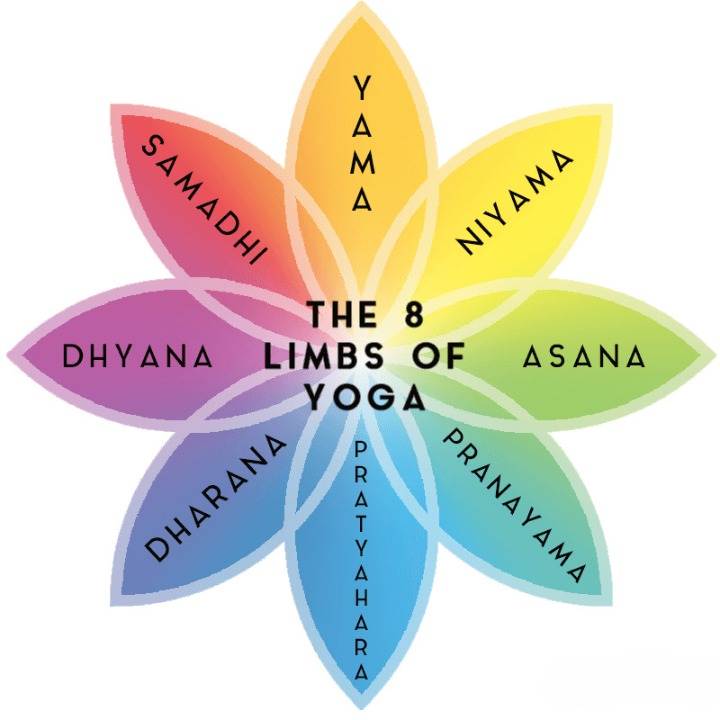Introduction
Attaining inner peace and balance can seem like an uphill battle in the busyness of modern life. Nonetheless, amid the confusion, the ancient lessons of yoga philosophy offer a glimmer of hope. We’ll explore how these profound ideas provide useful answers to our day-to-day problems in this blog. Adopting yoga philosophy opens our eyes to a wealth of knowledge that gives us the means to face life’s obstacles with grace and resiliency. We can develop a deep sense of harmony within ourselves and our environment by applying mindfulness. Come along on this journey as we investigate how wisdom from the past can illuminate the way to better health and tranquility in the contemporary world.
The Eight Limbs of Yoga: The Patanjali Yoga Sutras, which present yoga philosophy, provide a thorough framework known as the Eight Limbs of Yoga. These limbs provide direction for leading a purposeful and happy life. Let’s take a quick look at each limb and how it can be used in contemporary life:

- The yamas are a set of ethical rules that include things like moderation, honesty, non-stealing, non-violence, and non-possessiveness. Following these moral precepts can help us create more positive relationships, advance social justice, and develop integrity in all facets of our lives in the modern world.
- Self-discipline is one of the niyamas, which are practices that include self-control, self-education, contentment, introspection, and submission to a higher power. By implementing these techniques into our everyday lives, we can improve our resilience, self-awareness, and inner tranquility.
- Asana (Physical postures): Although yoga asanas are frequently connected to physical activity, they can also be used to develop flexibility, strength, and balance in the body and mind. Frequent asana practice can promote physical relaxation and reduce stress, which will enhance general wellbeing.
- Breath control (Pranayama): To improve vitality and mental clarity, pranayama techniques involve conscious control of the breath. By incorporating pranayama into our daily routine, we can improve our energy levels, calm down, and regulate our nervous systems.
- Pratyahara, or “sense withdrawal,” is the practice of turning our attention inward and withdrawing the senses from outside distractions. By using mindfulness and meditation to practice pratyahara, we can find moments of calm in today’s hyperconnected world where noise and stimulation are all around us.
- Dharana (Concentration): Dharana is practicing concentration and single-minded focus. Our ability to focus our minds on a single thing at a time can improve our mental clarity, creativity, and productivity.
- Dhyana (Meditation): Dhyana is a type of prolonged meditation in which the focus of the mind is fixed entirely on the subject of meditation. Deep levels of inner calm, wisdom, and spiritual awakening can result from regular meditation practice.
- The ultimate aim of yoga is samadhi, or “union with the divine,” a state in which the practitioner becomes one with the cosmos. Even though it might sound like a lofty ideal, deep meditation, selfless service, or profound moments of awe and connection with nature can all lead to glimpses of samadhi.
Useful Applications
After learning about the eight limbs of yoga, let’s talk about some useful ways to apply the philosophy of yoga to our everyday lives:
- Mindful movement: Including mindful movement in our everyday routines can help us re-establish a connection with our bodies and reduce stress. This can be achieved through tai chi, yoga poses, or even just taking a stroll in the outdoors.
- Conscious breathing: Deep breathing techniques can help lower stress levels, relax the nervous system, and improve mental clarity. Spend a few minutes each day practicing these techniques.
- Self-reflection: Making time for introspection and journaling can help us better understand our feelings, ideas, and actions, which promotes self-awareness and personal development.
- Gratitude cultivation: By recognizing the blessings in our lives on a daily basis, we can change our mindset from one of scarcity to abundance, which will increase our level of fulfillment and contentment.
- Serving others: Performing deeds of kindness and service to others improves not only the lives of those we assist but also our own happiness and contentment.

Conclusion
By incorporating the philosophy of yoga into our daily lives, we can become resilient in the face of contemporary challenges. We cultivate inner peace and harmony via self-awareness, mindfulness, and compassion, which leads to a deeper and more fulfilling life. Our quest for self-awareness equips us with the ability to handle the challenges of life with poise and composure. By accepting these ageless ideas, we open ourselves up to a wealth of knowledge that directs us toward harmony, happiness, and meaning in life. Through the application of yoga philosophy to our lives, we take a transformative journey that enhances our existence and promotes our well-being, enabling us to flourish in the face of modern-day challenges.
